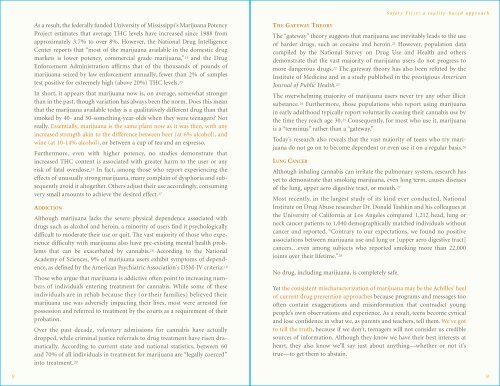SAFETY FIRST - Drug Policy Alliance
SAFETY FIRST - Drug Policy Alliance
SAFETY FIRST - Drug Policy Alliance
Create successful ePaper yourself
Turn your PDF publications into a flip-book with our unique Google optimized e-Paper software.
Safety First: a reality-based approach<br />
As a result, the federally funded University of Mississippi’s Marijuana Potency<br />
Project estimates that average THC levels have increased since 1988 from<br />
approximately 3.7% to over 8%. However, the National <strong>Drug</strong> Intelligence<br />
Center reports that “most of the marijuana available in the domestic drug<br />
markets is lower potency, commercial grade marijuana,” 14 and the <strong>Drug</strong><br />
Enforcement Administration affirms that of the thousands of pounds of<br />
marijuana seized by law enforcement annually, fewer than 2% of samples<br />
test positive for extremely high (above 20%) THC levels. 15<br />
In short, it appears that marijuana now is, on average, somewhat stronger<br />
than in the past, though variation has always been the norm. Does this mean<br />
that the marijuana available today is a qualitatively different drug than that<br />
smoked by 40- and 50-something-year-olds when they were teenagers? Not<br />
really. Essentially, marijuana is the same plant now as it was then, with any<br />
increased strength akin to the difference between beer (at 6% alcohol), and<br />
wine (at 10-14% alcohol), or between a cup of tea and an espresso.<br />
Furthermore, even with higher potency, no studies demonstrate that<br />
increased THC content is associated with greater harm to the user or any<br />
risk of fatal overdose. 16 In fact, among those who report experiencing the<br />
effects of unusually strong marijuana, many complain of dysphoria and subsequently<br />
avoid it altogether. Others adjust their use accordingly, consuming<br />
very small amounts to achieve the desired effect. 17<br />
ADDICTION<br />
Although marijuana lacks the severe physical dependence associated with<br />
drugs such as alcohol and heroin, a minority of users find it psychologically<br />
difficult to moderate their use or quit. The vast majority of those who experience<br />
difficulty with marijuana also have pre-existing mental health problems<br />
that can be exacerbated by cannabis. 18 According to the National<br />
Academy of Sciences, 9% of marijuana users exhibit symptoms of dependence,<br />
as defined by the American Psychiatric Association's DSM-IV criteria. 19<br />
Those who argue that marijuana is addictive often point to increasing numbers<br />
of individuals entering treatment for cannabis. While some of these<br />
individuals are in rehab because they (or their families) believed their<br />
marijuana use was adversely impacting their lives, most were arrested for<br />
possession and referred to treatment by the courts as a requirement of their<br />
probation.<br />
Over the past decade, voluntary admissions for cannabis have actually<br />
dropped, while criminal justice referrals to drug treatment have risen dramatically.<br />
According to current state and national statistics, between 60<br />
and 70% of all individuals in treatment for marijuana are “legally coerced”<br />
into treatment. 20<br />
THE GATEWAY THEORY<br />
The “gateway” theory suggests that marijuana use inevitably leads to the use<br />
of harder drugs, such as cocaine and heroin. 21 However, population data<br />
compiled by the National Survey on <strong>Drug</strong> Use and Health and others<br />
demonstrate that the vast majority of marijuana users do not progress to<br />
more dangerous drugs. 22 The gateway theory has also been refuted by the<br />
Institute of Medicine and in a study published in the prestigious American<br />
Journal of Public Health. 23<br />
The overwhelming majority of marijuana users never try any other illicit<br />
substance. 24 Furthermore, those populations who report using marijuana<br />
in early adulthood typically report voluntarily ceasing their cannabis use by<br />
the time they reach age 30. 25 Consequently, for most who use it, marijuana<br />
is a “terminus” rather than a “gateway.”<br />
Today’s research also reveals that the vast majority of teens who try marijuana<br />
do not go on to become dependent or even use it on a regular basis. 26<br />
LUNG CANCER<br />
Although inhaling cannabis can irritate the pulmonary system, research has<br />
yet to demonstrate that smoking marijuana, even long term, causes diseases<br />
of the lung, upper aero digestive tract, or mouth. 27<br />
Most recently, in the largest study of its kind ever conducted, National<br />
Institute on <strong>Drug</strong> Abuse researcher Dr. Donald Tashkin and his colleagues at<br />
the University of California at Los Angeles compared 1,212 head, lung or<br />
neck cancer patients to 1,040 demographically matched individuals without<br />
cancer and reported, “Contrary to our expectations, we found no positive<br />
associations between marijuana use and lung or [upper aero digestive tract]<br />
cancers…even among subjects who reported smoking more than 22,000<br />
joints over their lifetime.” 28<br />
No drug, including marijuana, is completely safe.<br />
Yet the consistent mischaracterization of marijuana may be the Achilles’ heel<br />
of current drug prevention approaches because programs and messages too<br />
often contain exaggerations and misinformation that contradict young<br />
people’s own observations and experience. As a result, teens become cynical<br />
and lose confidence in what we, as parents and teachers, tell them. We’ve got<br />
to tell the truth, because if we don’t, teenagers will not consider us credible<br />
sources of information. Although they know we have their best interests at<br />
heart, they also know we’ll say just about anything—whether or not it’s<br />
true—to get them to abstain.<br />
8<br />
9


